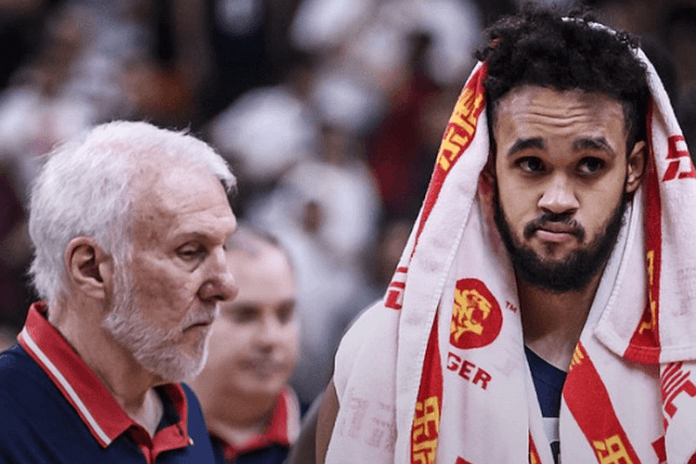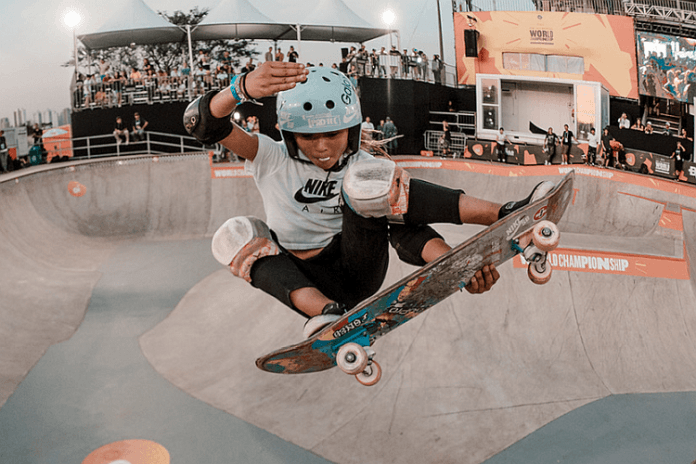 There wasn’t a lot of attention given to the U.S. team in advance of the 2019 FIBA World Cup in China. It was a team of NBA players, and the expectation was that it would be good enough, at least win a medal, yes?
There wasn’t a lot of attention given to the U.S. team in advance of the 2019 FIBA World Cup in China. It was a team of NBA players, and the expectation was that it would be good enough, at least win a medal, yes?
Even though few Americans watched any of the FIBA World Cup from China live – thanks to the time-zone differences to Asia – there was a clearly-understood result.
Failure.
The U.S. scraped by Turkey in pool play, but remained undefeated through the first two rounds of the tournament. In the quarterfinals, however, the U.S. was defeated by France, 89-79 on Wednesday and relegated to the fifth-place bracket. On Thursday, the U.S. was down, 32-7, after the first quarter against Serbia, rallied, but lost, 84-79, and will play Poland on Saturday for seventh place.
It’s the worst performance ever by a U.S. men’s team in the history of the Olympics (back to 1936) or the FIBA World Championships (back to 1950). The previous low was sixth at the 2002 Worlds, which was coincidentally played in the United States.
So now what?
There are a lot of long faces, starting with the players and the coaching staff. USA Basketball Managing Director Jerry Colangelo, the architect of the recent renaissance of the U.S. in international play, had some sharp comments after the Serbia loss that included:
“[We] went in with higher expectations in terms of roster, and it didn’t kind of happen the way we were hopeful and anticipating and expecting. That, to me, was a big disappointment.”
and
“Going forward for USA Basketball, we’re going to need the cooperation of teams, agents and then there has to be communication with players 1-on-1 to solidify those commitments. I am going to be anxious to see how many players reach out early to indicate that they wish and want and desire to play. But I’ll make this statement: It’s as much about maybe who we don’t want as much as who we want.”
Colangelo noted that of the original pool of 35 players from which the World Cup team was supposed to be selected, just four actually made it to China. Putting more emphasis on the roster is good and is needed. Compared to recent U.S. teams at the World Cup – let’s forget about the Olympics for a moment – this was a lower-caliber squad. Looking at the U.S. team vs. the best in the NBA underlined this. Consider (U.S. Olympic participation in parentheses):
2019 All-NBA First Team:
● 3 from the U.S., none played in the World Cup.: James Harden (2012), Steph Curry, Paul George (2016);
● 1 from Greece, who played in the World Cup: Giannis Antetokounmpo;
● 1 from Serbia, who played in the World Cup: Nikola Jokic.
2019 All-NBA Second Team:
● 5 from the U.S., none played in the World Cup: Joel Embiid, Kevin Durant (2012-16), Damian Lillard, Kyrie Irving (2016), Kawhi Leonard.
2019 All-NBA Third team:
● 4 from the U.S., one played in the World Cup: Kemba Walker; Russell Westbrook (2012), Blake Griffin, LeBron James (2008-12) did not play;
● 1 from France, who played in the World Cup: Rudy Gobert
So of the 15 All-NBA players from this past season, one of the 12 Americans played on the U.S. World Cup team, but all three of the foreign players played on their national teams.
That’s a problem.
There are others as well. The World Cup was played in its now-usual time frame of the first two weeks of September. That’s been the case for 2010-14-19; the tournament was a couple of weeks earlier in 2002-06; perhaps it might be moved earlier in the future?
Moreover, FIBA’s change of the year of the tournament made a big difference. From 1970-2014, the World Cup – then known as the FIBA World Championship – was played in the even year between Olympic Games. For commercial and promotional reasons, especially to escape the all-consuming FIFA World Cup, the event was moved to the year before the Olympic Games, as it was in 1959-63-67. That meant that players who wanted to compete in the Worlds and the Olympic Games would be playing tournament games in two consecutive years; that’s a significant burden.
The FIBA Women’s World Cup is played in the even years between Olympics, starting in 1986.
Those are issues which USA Basketball will have to consider, and could then make a proposal to FIBA for changes. But that’s well into the future.
For the present, any concerns about the U.S. team for Tokyo in 2020 have to be evaluated against three realities:
(1) Colangelo, USA Basketball and U.S. head coach Gregg Popovich are well aware of the issues and will be determined to fix them;
(2) The Olympic Games is a lot different than the World Championships, and a lot more people will be paying attention. Look for American games to be scheduled so that they can be seen at a reasonable hour in the U.S.
(3) Let us not forget that we have seen this movie before, with the prior coach, Duke’s Mike Krzyzewski:
● At the 1990 World Championships, playing with collegians, his U.S. team was 6-2 and finished third. The U.S. was 5-1 through two rounds, lost by 99-91 to Yugoslavia in semis but defeated Puerto Rico for the bronze medal.
The following Olympics in Barcelona in 1992 had the original “Dream Team” of NBA stars that included Michael Jordan, Magic Johnson, Larry Bird, Charles Barkley and more and won the gold medal easily.
● At the 2006 World Championships, the U.S. was now using NBA players, but also stumbled in the semifinals, losing to Greece, 101-95, then beating Argentina for the bronze by 96-81.
Krzyzewski and Colangelo got it right for the 2008, 2012 and 2016 Olympic Games and for the 2010 and 2014 World Cups, going undefeated (42-0) in all five.
So a stumble now and then is going to happen. And the wake-up call has gone out.
There are winners, of course, with the U.S. losing. One of the four remaining semifinalists – Australia, France, Spain and Argentina – is going to win the title, with the resulting excitement for basketball in that country.
And the biggest winner of all might be NBC, which will benefit from much greater interest in the men’s Olympic tournament now that the American men were skunked in China. Rest assured of great ratings for possible Olympic re-matches against France, Serbia and even Australia, which beat the U.S. once in a pre-World Cup exhibition.
Funny how a little losing can make such a difference to a program which has been a winner for so long. Have no doubt, Colangelo and Popovich, want it to be that way again.
Rich Perelman
Editor
If you enjoyed this commentary, sign up to receive the TSX Daily by e-mail, five days a week by clicking here. You can also refer a friend by clicking here.
























